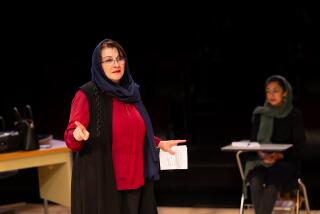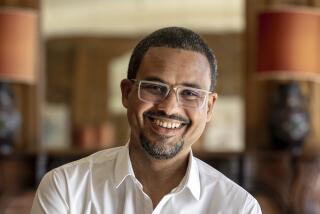Iraqi Translator Delights in Having Shakespeare Players Speak Arabic : Literature: It took 24 years of ‘agony and pleasure’ for him to translate 6 plays and 40 sonnets. Now he says he’s through.
- Share via
BAGHDAD, Iraq — Love’s labor has not been lost for Jabra Ibrahim Jabra, one of the giants of contemporary Arab letters who has translated Shakespeare’s plays and sonnets into Arabic. Critics say they are the best translations of The Bard yet in Arabic.
It took him 24 years, from 1959 to 1983, to translate “Hamlet,” “Coriolanus,” “King Lear,” “Macbeth,” “Othello,” “The Tempest” and 40 of the sonnets.
Now he says that’s it.
“I wanted to translate all his plays,” Jabra said in an interview at his home in a fashionable Baghdad suburb. “But after finishing ‘The Tempest’ I realized it was virtually impossible. I’d never have the time to do anything else.”
He said “The Tempest,” which he completed in 1979, was the toughest to translate because “it was deceptively lyrical, which makes it very difficult to render in another language.”
“His translations of Shakespeare and other Western works are very, very beautiful,” said Professor Abbas al-Tonsi of the American University in Cairo.
Eisa Abu-Shamsieh, an Arab academic, noted in a literary thesis on Jabra that his Shakespeare translations “as well as scholarly studies on Shakespeare’s works stand as a remarkable contribution to the modern Arabic drama in particular, and literature in general. His accuracy in translation is a characteristic upon which his critics agree.”
Jabra, 69, is one of the most prolific and versatile Arab writers; he is a novelist, poet, essayist, critic and translator as well as artist.
He has translated Oscar Wilde, Emile Zola, Guy de Maupassant, Chekov, Andre Maurois, Walt Whitman, Dylan Thomas, Ezra Pound, Edith Sitwell and William Faulkner along with many English poets such as Shelley, Keats, Dryden and Byron.
“It took me a year to do ‘Hamlet,’ the first Shakespeare play I translated,” Jabra said.
“It was an agony and a pleasure,” he added, sitting in his study lined with books in Arabic, English and French as well as paintings and sculptures by himself and other Iraqi artists.
“It was something I’d always wanted to do. I’d had this ambition since I was a young man,” he explained.
“Ever since I first read ‘Julius Caesar’ in Jerusalem when I was a boy I’d always wondered if it was possible to make Shakespeare’s characters talk in Arabic without losing the force of his words in English.”
When he studied at Cambridge University in England, he found that Arabic translations of Shakespeare were “verbally awkward, strangely static.”
So he decided to do his own and found himself immersed in “the almost impossible task” of sustaining the “same verbal charge, the evocative imagery, sustained metaphors, diversity of rhythm and tone, the eloquence and the word play” into another language.
Apart from such works as his novel “Hunters in a Narrow Street,” which was originally written in English and published in 1960, and several collections of poetry, he has written seven major novels in Arabic, among them “The Ship,” “The Search For Walid Masoud” and “The Other Rooms.”
Professor Tonsi noted: “Jabra and another novelist, Abdel-Rahman Munir, are considered the only two Arab novelists whose influence could go beyond that of Naguib Mahfouz,” who won the 1988 Nobel Prize for Literature.
Jabra was born in Bethlehem in pre-1948 Palestine, the son of a Christian farmer who fell on hard times, forcing the family to move to Jerusalem.
There, Jabra quit school to work as a carpenter and plumber. But he continued studying at the Arab College and later went to Cambridge. In 1952-54, he studied at Harvard.
He returned to Palestine in 1943 and worked as a teacher in Jerusalem before being driven into exile, at the age of 29, when the state of Israel was declared.
Exile has been one of the central creative forces of his life, engendering a passion for his Arab heritage and Arab nationalism. He converted to Islam in Baghdad, where he wound up in 1948.
He taught English literature at Baghdad’s College of Arts and, he said, “preached change unashamedly.”
He said he told his students: “We lost Palestine because we had confronted a ruthless force with an outmoded tradition.
“We had been cheated and betrayed by thousands of years of decay. We’ve been victims of our insane rhetoric.”
Jabra noted as he puffed on his ever-present pipe: “Change has to begin with a change of vision, with a new way of looking at things.”
Jabra’s understanding of the West and European literature has combined with a burning belief, shared by many Arab intellectuals, that the Arab world has to change in all facets of life to survive and preserve its rich heritage.
The heroes of his novels are generally Arab intellectuals standing alone, facing up to the unknown and dreaming of change.
More to Read
Sign up for our Book Club newsletter
Get the latest news, events and more from the Los Angeles Times Book Club, and help us get L.A. reading and talking.
You may occasionally receive promotional content from the Los Angeles Times.










